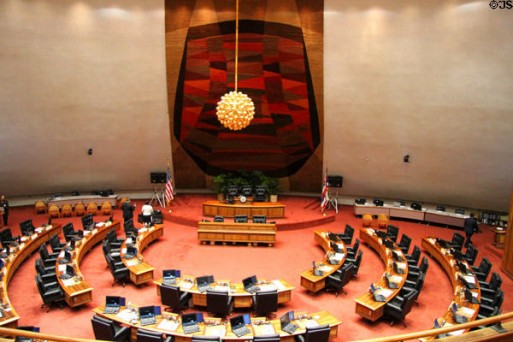
Hawaii may be on its way to becoming the fourth state that legalizes physician-assisted dying. A ten-person panel of experts on Hawaii law, medicine, elder care, legislation, and end-of-life issues convened in Honolulu, in a conference aptly titled, Is Physician-Assisted Dying Already Legal in Hawaii?
The conference was hosted by Rep. Blake Oshiro and sponsored by the Honolulu Star-Advertiser. The panel, weighted with aid-in-dying advocates, heard the argument by Kathryn Tucker, legal affairs director of the advocacy group Compassion and Choices, that aid-in-dying has been legal in Hawaii for years.
Proponents say that the panel’s well-publicized findings will set a precedent for future healthcare in the island state, and open the door for Compassion and Choices to begin working with physicians to develop patient safeguards. Says Robert Orfali, author of Death with Dignity, “It appears that for the last 100 years Hawaii was a prohibition-free state, but we didn’t know it.”
Kathryn Tucker’s argument strings together a series of relatively recent state acts which Hawaii has joined, but is largely based on an obscure 1909 Hawaiian law originally intended to give terminally ill patients access to drugs that had yet to be approved by the government:
“[W]hen a duly licensed physician or osteopathic physician pronounces a person affected with any disease hopeless and beyond recovery and gives a written certificate to that effect to the person affected or the person’s attendant nothing herein shall forbid any person from giving or furnishing any remedial agent or measure when so requested by or on behalf of the affected person.”
The wording of this law is open-ended, and when taken with the 1999 Universal Health-Care Decisions Act, and the 2004 Pain Patients’ Bill of Rights, a patient’s end-of-life options are in fact already broad. Barbara Coombs Lee of Compassion and Choices writes that these laws together “give terminally-ill patients significant freedom of choice to determine their course of medical care at the end of life and protection to physicians who provide that chosen care.”
But this is just the latest chapter in a protracted battle surrounding physician-assisted suicide. In 2003, the Hawaii house approved a bill closely modeled on Oregon’s successful Death with Dignity act, that was then narrowly defeated in the state senate, and subsequently abandoned by a newly elected Governor. The controversy was revived in 2007, and again earlier this year, when Senate Bill 803, another model of Oregon’s law, was defeated by the senate health committee: as in 2003, this followed an emotional parade of supporters and detractors, with over 150 individuals signing up to testify before the committee. Writes Scott Foster in the Honolulu Star-Advertiser, “I remain convinced that the well-organized opposition to DwD legislation in Hawaii and elsewhere is more about money and God than about our solving the many challenges associated with an aging population.”
And so the battle rages on. Soon after the panel convened last week, Karen DiConstanzo, President of the Aloha Life Advocates, released a statement calling the panel a “PR stunt to create a news story and arouse public interest in their cause,” and writing, “We need to act now to counter these ridiculous claims and protect the public from these false reports.”
Yet public opinion in Hawaii would appear to back aid-in-dying far more decisively than elsewhere in the country. Repeated polls since the beginning of the decade have shown a steady rise in support: in February of this year, a full 77% of respondents replied yes when asked, “Do you favor legalizing physician-assisted suicide for the terminally ill.”
As in Washington, Oregon, and Montana, the aid-in-dying controversy continues to enflame passions and inspire rhetorical, legal, and legislative tussles. Kathryn Tucker’s argument has yet to be tested legally. If anything, she has provided a template, and paved a theoretical path for a Supreme Court decision that there is nothing in the state constitution prohibiting physician aid-in-dying consultations.
A similar decision was found in Montana’s 2009 verdict in Baxter vs. Montana, which concluded that physician aid-in-dying consultations were not specifically outlawed. However, Hawaii does not have a Death with Dignity Act, and Montana’s decision is not yet protected by the state constitution, as it is in Washington and Oregon. Indeed, perhaps the only unequivocal conclusion that can be drawn from the panel’s findings is that the issue isn’t going away any time soon.

 The Ongoing Aid-in-Dying Debate
The Ongoing Aid-in-Dying Debate



 The Healing Sound of Singing Bowls
The Healing Sound of Singing Bowls
 “Summons” by Aurora Levins Morales
“Summons” by Aurora Levins Morales














